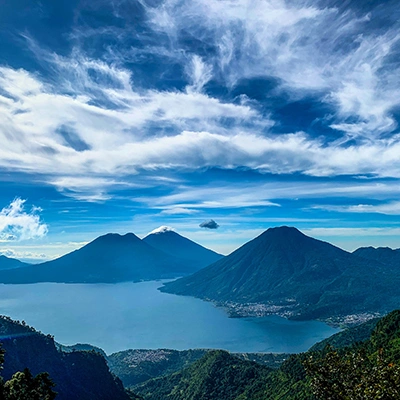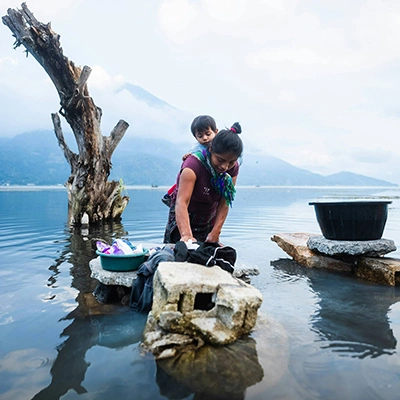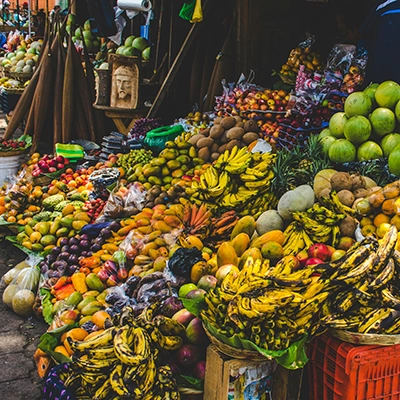"Die parasites!" my French-Canadian roommate says as she downs a potent shot of powdered grapefruit seed extract and aqua.
She has giardia, a type of parasite, and has chosen the natural route to treating it.
I’ve also been infected with parasites — amoebas — for a few months. Things have been just a touch off, digestively speaking. There’s nothing like intestinal parasites to help clean out your system. But unlike my roommate, I’m on antibiotics.
Gut health affects our mood, sleep patterns, and stress levels. Since I desired to be jolly, well-rested, and stress-free, I opted for Metronidazole twice a day for 10 días to treat my Entamoeba histolytica, a Latin name that loosely translates to “colony of jerks."
 Common Parasites in Guatemala
Common Parasites in Guatemala
Besides giardia, which comes from contaminated water, and amoebas, other types of parasites common in Guatemala include malaria and helminths. You probably know that last one as hookworms, roundworms, and whipworms.
Taeniasis and cysticercosis aren’t exactly household names, but they’re conditions caused by parasites endemic in Guatemala and Belize. Taeniasis is usually a mild intestinal infection resulting from eating undercooked pork. Although cysticercosis is also caused by eating undercooked food, it is more serious, and attacks your muscles, brain, and other tissues.
Unfortunately, it’s not unusual to come across parasites in Central America. Just like there's a cold and flu season where I’m from in North America, there is a parasite season down here. According to the locals and Guatemala frequenters, May and June are the worst.
It’s not just in the so-called third-world countries that you can get a parasite, though. The Centers for Disease Control and Prevention (CDC) estimates that more than 60 million people in the U.S. have parasites. You might have one right now and not even realize it.
If you’ve spent significant time around Lake Atitlan in Guatemala, I’d be surprised if you didn’t get a case of water parasites. It’s not just tourists, either.
"Do you guys have the same problems with parasites?" I asked my Mayan Katchequel teacher.
"No," she says, "Our stomachs are strong. As soon as we detect signs of parasites, we vomit to rid ourselves of them."
That, and they chew a lot of papaya leaves, which might be a great preventative measure and treatment method for parasites, among treating other illnesses. But I’m no doctor.
How Do You Get Parasites?

- Climate and environment can cause infections to spread at faster rates. That’s partly why you see outbreaks of parasites in hot, humid regions, particularly after flooding.
- Parasites can enter your body through contaminated food, undercooked meat, and unclean water, which is why people always warn you about eating street food and drinking from the tap in some countries.
- Contaminated fruits and vegetables can also harbor parasites.
- Some parasites can enter the body through the bottom of your feet. Wear shoes to avoid contact with contaminated soil.
- You don’t always have to drink the water. Swimming in contaminated lakes, ponds, and rivers can also lead to infection.
How to Avoid Getting Parasites When You Travel
Avoiding parasites can seem like a full-time job because it is. It involves adopting practices that might seem a bit extreme. But after several uncompelling bouts with parasites, one becomes open to taking such measures.
1. Do your homework.
Before you even leave home, research which parasites are common at your destination. It might be helpful to learn a few of the symptoms, too.
Symptoms of parasites will be different depending on which bug you get, but some common signs to be aware of include:
- Nausea or vomiting
- Stomach pain
- Diarrhea
- Fever
- Itchy skin or a rash
- Low energy or lethargy
- Unexplained weight loss
Talk to your doctor about what to do if you get sick and if there are any vaccines or medications you should get before you travel.
2. Be a meal miser.
"Hey, try this," someone might say at a hostel or party as they push a nacho with their homemade guacamole toward you.
Long story short, you don’t know if they washed their hands before they made it. Many parasites worldwide hitch a ride from bathroom to kitchen if we don’t wash up after ourselves.
You don’t want to be a party pooper (pun 100% intended), and this measure might put you in a meal bubble, where all the culinary offers of the unvetted food world become off limits. But you can make this step as extreme and restrictive — or not — as you want.
3. Make sure your water isn’t a source of parasites.
We’re all familiar with the dreaded traveler’s diarrhea known as Montezuma’s Revenge in Mexico. So we know we don’t want to drink the water.
Don’t forget, too, that if you can’t drink the tap water, you don’t want to brush your teeth with it, either. You might not even want to wash your eyes in it. Use filtered water or this.
You can buy bottled water or take a more DIY approach and treat your own agua. There are some great products like Lifestraw, a popular water bottle filter unit. You can also boil your water to get rid of parasites, but be sure to keep it boiling for at least 15 minutes.
This precaution also means not swimming in suspect bodies of water. If you’ve ever heard of swimmer’s itch, this is typically a result of taking a dip where you shouldn’t have.
4. Try antiparasitics.
Antiparasitics can kill parasitic larvae or keep those microorganisms from growing and spreading. There are doctor-prescribed medications that are antiparasitics as well as natural methods, primarily foods. Find out which ones tingle your taste and keep them around your plate, cup, and life.
To name a few natural options, think about garlic, red onion, coconut oil, pumpkin seeds, kefir, kombucha, fermented vegetables, apple cider vinegar, aloe vera, black walnut, cloves, barberry, goldenseal, pau d'arco tea, sangre de drago, oregano oil, wormwood, rosemary, and thyme.
Whether natural or pharmaceutical, always talk with a medical professional before starting any kind of treatment regime.
 5. Fly away.
5. Fly away.
Parasites use flies as vectors to propagate. That’s just a fancy way of saying that flies give rides to giardia or other parasites, letting them spread far and wide.
Even nonbiting flies can pass along a parasite, often by landing on and contaminating your food. Not every fly is carrying a parasite, but you still want to take adequate precautions and not leave food out in the open.
To deter biting insects, insect repellent can help, as well as mosquito netting while you sleep, and long-sleeved shirts and pants.
6. Think before you open your mouth.
We all remember from COVID times that you don’t want to touch your face more than is absolutely necessary. The same goes for limiting infection from parasites, especially those that enter your body —and intestines — through the mouth and throat.
Keep your hands washed, especially after handling money and before eating. Hand sanitizer is your best friend and a parasite’s worst enemy.
7. Be not afraid.
Even with our best efforts, parasites happen. I talk to a lot of travelers about parasites because they’re on a lot of symptomatic people's minds. Most listen and log my advice with the rest of the things I looked up online. Still, a few people go pale and frown. They give into the fear.
Don't give into the fear. Parasites are usually easy to identify and treat. Just take adequate precautions, insure and inform yourself, and get checked if you have symptoms.
What to Do When You Get Parasites Abroad
1. Get medical care ASAP.
If you did your research before your trip, hopefully you’ll be able to identify some of the symptoms of common parasites. If you feel sick, see a doctor as soon as you can. Most parasites are treatable, and the sooner you seek care, the easier it will be.
Sometimes it can be hard to figure out where to go when you need medical care in another country. If you have travel insurance from Seven Corners, you also have 24/7 access to our Assist Team, which will help you find a doctor, arrange translation services if needed, and more, so that you can get on the road to recovery.
2. Be a patient advocate for yourself.
At home, like abroad, it's important to be your own patient advocate. Doctors make mistakes and misdiagnose. They can recommend the wrong medicine. Lab results are not 100%.
In a foreign country, when you are sick and weak, it's possible to feel overwhelmed, so it's important to feel capable when navigating a foreign country’s medical system. If
3. Use your travel insurance.
Travel medical insurance can cover the expense of treatment if you get sick during your trip. If you get a parasite, hopefully the course of treatment will be quick and painless. But severe cases can quickly get expensive. Rather than paying for medical bills out of pocket, rely on your travel insurance to ease that financial burden.
In the most severe cases, travel insurance can cover emergency medical evacuations. If your destination cannot provide adequate medical care, Seven Corners can pay for and arrange for you to be transported to a medical facility that can deliver care.
Seven Corners customer Alysan was glad of this benefit when she contracted malaria — a disease caused by a parasite — in Ghana.
Travel insurance can also help with trip delays and trip interruption if you need to quarantine or change your travel plans because of your illness.
Travel Insurance for Parasites
To find the right travel insurance for your next trip, and to be covered in the event of an illness or injury during your trip, visit SevenCorners.com for a quick quote. You can also contact our licensed sales team with any questions or to make sure you’re protected against parasites and more.
About the Authors
Luke Maguire Armstrong has traveled to more than 30 countries, no doubt picking up countless microorganisms — friendly and otherwise — along the way. He frequently shares stories from the road on the Seven Corners blog and in his book, The Nomad’s Nomad.
This article was edited and factchecked by Becky Hart.
Travel Like a Pro with The Wayfinder
Did you enjoy this blog? Get more articles like it before anyone else when you subscribe to our monthly newsletter, The Wayfinder.
Sign me up